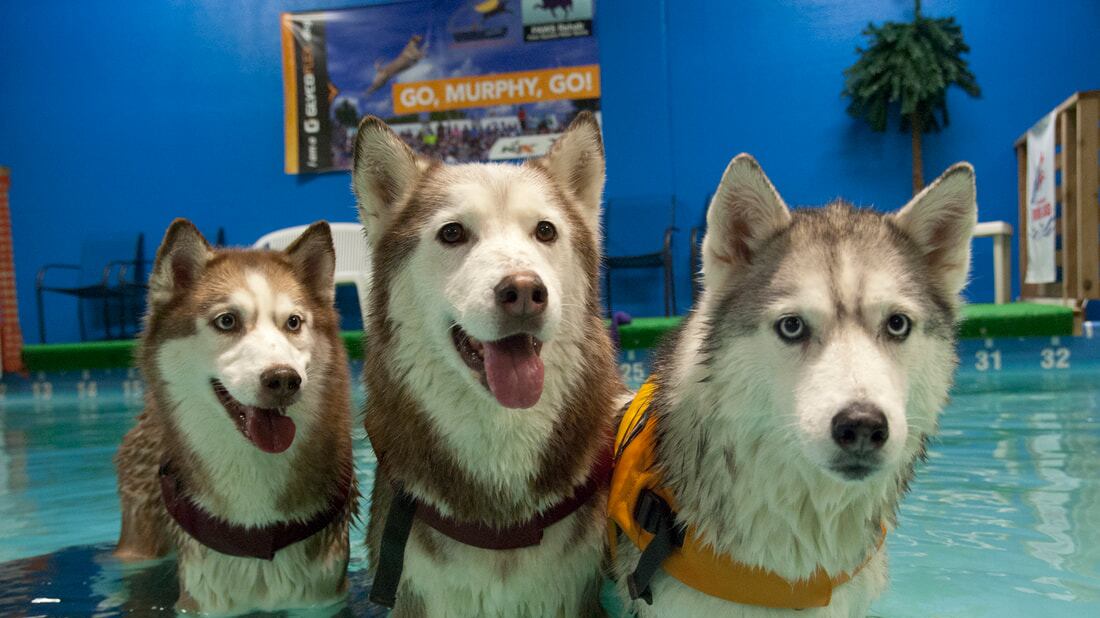Aside from the occasional bump into the side of the pool, you’d never guess that Faye was deaf and blind just by glancing. The 13-and-a-half-year-old pit-Lab mix paddles around the water with purpose (and, at her age, the assistance of a bright red life jacket). The typical mission: tracking down and retrieving the ball her owner has thrown.
This simple game of fetch is why Casey Lyons makes the weekly drive to Paws Rehab in the industrial hinterlands of Hillsboro from his home in St. Johns. Faye used to chase down toys in the Willamette River much closer to their neighborhood, but now that her vision is shot, swimming in open water is no longer safe. However, the senior pooch isn’t just engaged in play at Paws—one of the only aquatic centers around whose pools are dedicated to dogs. The sessions double as physical therapy.
“She can’t really go on walks anymore,” Lyons explains. “You know, she’s still got the energy to want to do stuff, but her joints can’t take it.”
Stiff hips and knees, as well as injury recovery, account for about half of all of Paws’ business. The facility, tucked into the corner of a manufacturing park, boasts two pools along with a pair of underwater treadmills that allow dogs recuperating from surgery to begin exercise while bearing a fraction of their weight.
That equipment can only be found at a handful of veterinarian offices and hydrotherapy clinics around the Willamette Valley—some of which have monthslong waitlists for new patients, making Paws highly sought after by parents with fur babies in need of treatment.
“We have people come here for treadmills from Yakima and Southern Oregon, because there really aren’t all that many around,” co-owner Julie Thomas says. “If your dog has surgery and your vet wants them to start mobility, you can’t wait that long.”
Both Thomas and business partner Diane Kunkle, who founded Paws in 2009 at her Milwaukie home (the 40-foot indoor pool there still services clients), began looking into animal water rehab after their dogs developed health issues.
Kunkle, a longtime licensed vet technician, had a Labrador that injured its cruciate ligament in 1984 and discovered that therapy was virtually nonexistent. Seeing a lack of options, she decided to become one by launching Paws and earning certification as a canine rehabilitation practitioner through the University of Tennessee.
Meanwhile, Thomas, who always owned dogs but had a career in the tech industry, started taking animal massage classes in an effort to help her arthritic Lab. After getting laid off from Intel in 2009, she decided to ditch corporate America in favor of clients of the canine variety, opening Doggie Paddle inside LexiDog on South Macadam Avenue.
Since the local pool of aquatic dog therapists is about as large as a puddle, Kunkle’s and Thomas’ paths eventually crossed. Each grew their business to the point where expansion was the natural next step, prompting the two to team up and launch a second, much-larger Paws than the one at Kunkle’s house.
After overcoming the hurdle of being located solely on private property to a business that also rents—turns out, telling prospective landlords that your setup involves thousands of gallons of water and dogs results in a lot of hung-up calls—the Hillsboro spot welcomed its first four-legged clients in 2015.
Since then, Paws has seen more than just dogs taking the plunge; a kitten, a goat and even a miniature horse have all put in rehabilitation time. “You never know what’s going to walk through the door,” Thomas laughs.
The horse might even be their most famous case: Tiny Dancer, a registered therapy animal who makes the rounds at Portland events often dressed as a unicorn with brother Elmo, came to Paws after dislocating her femur—an injury that typically results in euthanasia.
That would’ve been her fate had the Oregon State University Veterinary Teaching Hospital not stepped up to perform surgery. It was a chance doctors there were willing to take given her diminutive size. Still, the outlook was unclear when it came to mobility. But after months of marching on Paws’ treadmill, Tiny Dancer could run at full gallop once again.
“They said that this horse will never be able to walk well,” Kunkle says. “Right now, it’s out playing in its field with its brother. You would never know anything was wrong.”
While Paws’ most tear-triggering stories involve animals on the mend—a German shepherd with an amputated front leg learned it could still swim, a brown Lab that had to be carried inside regained the ability to walk—dogs don’t need to be injured in order to pay a visit.
For instance, the warehouse-sized space teaches dock diving, one of the fastest-growing dog sports in the U.S. Think of it as a combination of high jump and long jump for canines, only the landing pad is water instead of sand. But if high-flying recreation sounds too ambitious for the log dog in your life, owners can always book time for their pets to simply bob around one of the pools for an hour. Though Thomas warns that novices may be hesitant to dive in.
“What we find with dogs that have swam in natural water, sometimes it’ll take ‘em a few minutes,” she says. “First of all, the water’s the wrong color. Unless you live in Hawaii or Florida, this is not a color you’re going to see in nature. It’s also so warm, and there’s no goose poop and no dead fish. So for a lot of Northwest dogs, this is wrong.”
An initial assessment must be completed before any dog can set paw in water—and not because they might find the artificiality of a bird excrement-free turquoise pond intimidating. It’s all about safety. That may sound odd since a style of swimming is named after our canine pals. But it’s actually not a natural skill for all breeds, which is why Paws gives lessons and allows humans to practice using everything from paddleboards to kayaks with their dogs before heading out to our lakes and rivers.
“It’s a myth that all dogs can swim. They can’t,” Thomas says, “because a lot of dogs don’t really know how to use their back legs. So people see them splashing and they think that’s swimming. It’s like, no, that’s survival. At some point, they’re going to get tired and sink. The big thing is getting people to learn so that their dogs know how to survive in the water.”
VISIT: Paws Rehab at Sunset West Business Park, 1800 NE 25th Ave., Suite 17, Hillsboro, 503-640-4007, pawsrehab.net. 10 am-8 pm Tuesday-Wednesday, 10 am-6pm Thursday-Friday, 10 am-5 pm Saturday, 9 am-5 pm Sunday.

